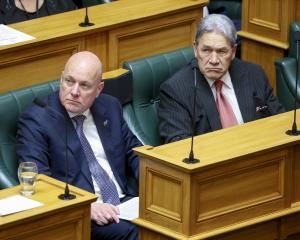

Our house was the last one up the Matiri Valley, near Murchison. There was one way in and the same way out. The road continued through our farm and further to Lake Matiri. It would still be foolhardy to attempt to drive a car that far.
A four-lane highway it was not. It was basically a one-lane gravel road where two vehicles approaching each other must head as far left as they could to avoid collision. Congestion was not an issue.
The bracken-lined road allowed Dad to make frequent threats to stop to get a fern stick whenever we kids were behaving badly in the back seat. All the same, we didn’t take him seriously. We knew he believed you should be able to raise a dog and a child without beating them. The one time he leapt out to grab a stick, the mere sight of it shocked us into good behaviour.
Sometimes, the lowest part of the road flooded, and we might get a day off school. Potholes were common. When road conditions got bad, Dad would mutter it was time for the local grader driver to get on the job. If I am on a poorly maintained gravel road now, I still futilely call for that man's services, though he died long ago.
When I learned to ride a bike, the road allowed me to explore beyond the boundary of our farm and even to visit neighbours. Falling off, skinning knees and getting gravel embedded in my palms was a small price to pay for that freedom.
The 1968 Inangahua earthquake rendered the road temporarily impassable by vehicles a few kilometres from our place. Coming home from boarding school in Nelson one holiday, I was taken by big black taxi from Murchison to the break in the road where I scrambled over the slip to Dad at the other side. Exciting. Who knew Murchison even had a taxi?
In summer, we could look down the valley and tell we were about to have a visitor from the clouds of dust heading our way. My house-proud stepmother would use that warning to whip out the broom and sweep the kitchen lino, prompting one of our neighbours to remark in an awestruck tone he had never seen as much as a crumb on our floor. Her secret was safe with us.
That dust became an issue when Dad insisted on sticking with our old Zephyr when it had so many holes in the floor (probably the result of too much cow manure flicking up from the road over the years) a trip to town left us all prematurely grey. The solution? Covering our heads with tea towels. Nowadays, we might be mistaken for some new religious sect, but locals knew we were stalwarts of the Catholic church.
During my primary school years, a start was made on sealing the beginning of the road. I recall there was much talk about plans to extend that by a few kilometres towards our place each year, but that soon petered out. Whether that was political expedience, poverty or practicality I am not sure, but it has made me wary of taking roading promises too seriously.
No-one would deny roads are needed around the country. We needed our road to connect us with the outside world; to ship out cream and wool and animals destined for the freezing works, to get to school and church and the shops, and to be able to get in supplies. Those exploring the wilds beyond our place, tramping, shooting, or fishing, also needed it for access.
But do we need bigger and bigger roads when we are supposed to be dramatically reducing our carbon emissions? The notion, from National leader Christopher Luxon, that building bigger roads will reduce congestion and emissions is so blatantly silly and lacking scientific credibility, it would make me laugh if it wasn’t so damned cynical.
It has been known for decades road building encourages more traffic. Congestion might be eased initially, but it does not take long for traffic to increase. I am sure the National Party knows this. The research on it is not hard to find, but the party chooses to ignore it in a cheap bid for votes from those still in denial about climate change. (It must also know only a tiny percentage of our traffic is electric and that will not change dramatically overnight.)
Labour’s multi-tunnel plans for Auckland seem just as pie in the sky.
At a time when we need bold leadership from our two major parties on emissions reductions, instead they behave like kids in a sandpit arguing about who has the biggest digger.
It’s enough to make me want to stop to get a fern stick.
- Elspeth McLean is a Dunedin writer.












